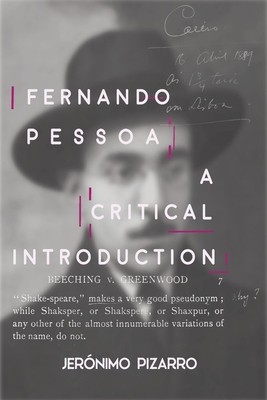
- We will send in 10–14 business days.
- Author: Jerónimo Pizarro
- Publisher: Liverpool University Press
- Year: 2020
- Pages: 256
- ISBN-10: 1789760690
- ISBN-13: 9781789760699
- Format: 16 x 23.6 x 2 cm, hardcover
- Language: English
- SAVE -10% with code: EXTRA
Reviews
Description
A Critical Introduction proposes a new didactic and dynamic way of reading the great twentieth-century poet Fernando Pessoa (1888-1935). The aim is to present a holistic vision of this complex poet, promoting his literary geniality in order to better understand his orthonymic-heteronymic poetry. A guiding motif is Pessoa's own Be as plural as the universe. In leading the reader through the poet's published literary work, Jerónimo Pizarro allows an intimate perspective, alongside an academic one, to better understand the workings of Pessoa's mind and life. Discussion centres on the dilemmas an editor faces when editing posthumously. A prime question revolves around the genesis of Pessoa's heteronyms and orthonyms. Understanding is revealed by a critical perspective on the unity that exists in all of Pessoa's literary work. Interpretations of the poems; explanation of the profundity of The Book of Disquiet; and his isms of Paulism, Caeirism, Intersectionism and Cessationism, are
discussed and analy
EXTRA 10 % discount with code: EXTRA
The promotion ends in 17d.19:28:26
The discount code is valid when purchasing from 10 €. Discounts do not stack.
- Author: Jerónimo Pizarro
- Publisher: Liverpool University Press
- Year: 2020
- Pages: 256
- ISBN-10: 1789760690
- ISBN-13: 9781789760699
- Format: 16 x 23.6 x 2 cm, hardcover
- Language: English English
A Critical Introduction proposes a new didactic and dynamic way of reading the great twentieth-century poet Fernando Pessoa (1888-1935). The aim is to present a holistic vision of this complex poet, promoting his literary geniality in order to better understand his orthonymic-heteronymic poetry. A guiding motif is Pessoa's own Be as plural as the universe. In leading the reader through the poet's published literary work, Jerónimo Pizarro allows an intimate perspective, alongside an academic one, to better understand the workings of Pessoa's mind and life. Discussion centres on the dilemmas an editor faces when editing posthumously. A prime question revolves around the genesis of Pessoa's heteronyms and orthonyms. Understanding is revealed by a critical perspective on the unity that exists in all of Pessoa's literary work. Interpretations of the poems; explanation of the profundity of The Book of Disquiet; and his isms of Paulism, Caeirism, Intersectionism and Cessationism, are
discussed and analy


Reviews